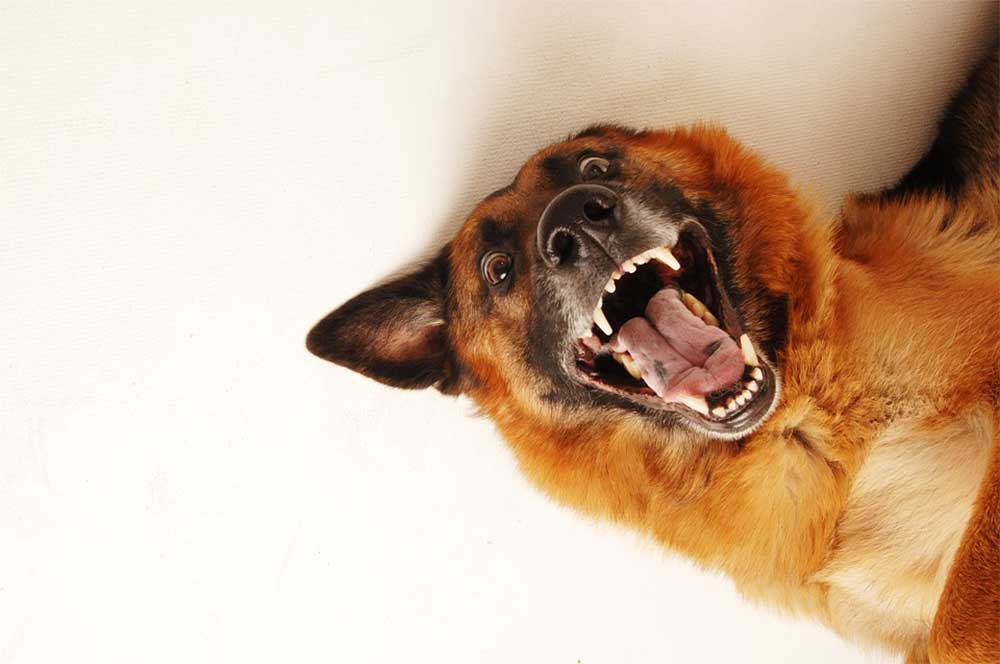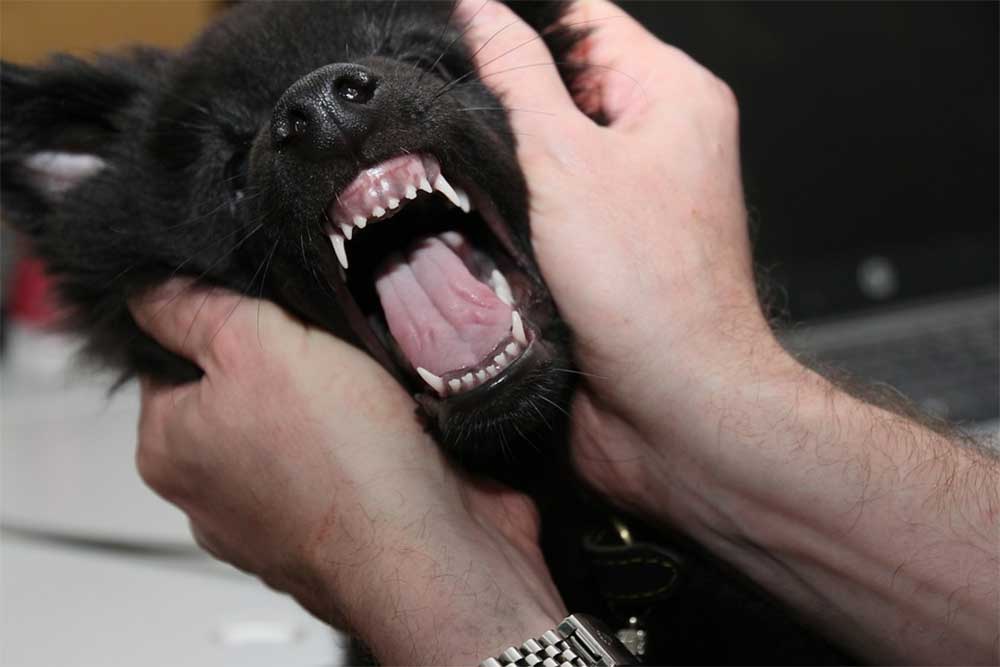When it comes to owning a pet, keeping on top of dental hygiene should be one of your priorities. Dogs will need to have regular check-ups on their teeth, they need to eat a blanched diet, and you need to make sure that you are keeping on top of their oral health. This will help to ensure that they do not develop any unwanted dental health problems.
Looking after your dog’s teeth and gums might seem difficult if you are not sure what to look out for. If you have noticed black spots on your dog’s gums, you might now be wondering why they are there and what it means.
In this article, we are going to tell you everything that there is to know about black spots on your dog’s gums, so you can know when everything is fine, or if you have got a problem on your hands. You will then be able to make sure that you are providing your dog with the best dental care possible, as you will know exactly what it all means.

Why Do Dogs Have Black Spots on Their Gums?
There are certain dog breeds that normally experience higher levels of pigmentation in their mouths, and this can cause their gums to have black spots. However, it can also be a sign of other oral issues, but this is typically not very common.
It is really important to stay vigilant if you think that there might be something wrong inside of your dog’s mouth, as this is how problems can be caught early on. Although, it is equally as important to research the breed of your dog, so you can find out if they are more likely to have these black spots on their gums.
If you have the resources to do so, it can be helpful to find out more about their genetic background to find out whether black spots on the gums is a pigmentation issue, or if it is something more sinister. We are going to explain some of the things that you can look out for below, so you can learn to understand what is normal and what is not.
Are Black Spots on Gums Normal for Dogs?
While it might be normal for some dogs to have black spots on their gums, it might not be normal for all dogs to have black spots on their gums. It is important to find out whether it is normal for your specific dog by considering if they have always been this way, or if this is something that has happened more recently.
There are some dog breeds that are predisposed to spotted tongues, gums, or even completely black mouths. If a dog does have back spots anywhere in their mouth, it is usually due to the fact that they have heavy pigmentation in the mucus membranes that make up their mouths.
More often than not, these black spots are simply microscopic granules of melanin, and they will be flat areas on your dog’s gums, on their tongue, and the inside of their lips and mouth. This pigmentation is usually genetic, and is determined by the genes that your dog carries.
Breeds of Dog That Have Black Spots on Their Gums
As we have previously mentioned, there are some dog breeds that are more predisposed to have black gums than other dog breeds. There up around 30 different dog breeds that are likely to have hyperpigmentation in their mouths, but we will name some of the most well-known breeds below:
- Mastiff breeds
- Pitbull breeds
- Dalmatians
- Irish Setters
- Newfoundlands
- Australian Shepherds
- Chow Chows
- Shar Peis
It is worth being aware that this list does not cover every breed of dog that may have black spots on their gums, but it does include the ones that are most likely to have this.
What Causes Black Spots in a Dog’s Mouth?
You might also be wondering what causes these spots in your dog’s mouth, and the reason for it is actually that there is heavy pigmentation in this area. These darker spots occur due to melanin, which can be found in your dog’s mouth. They are simply random spots of extra pigmentation, and this can happen to many breeds.
If these spots are flat, then they are completely normal, and you don’t need to worry about them. There are lots of breeds that this can occur in, and most of the time, it is not a sign that there is a problem.
Reasons For Black Gum Discoloration in Dogs

If the black dots on the gums have not been there since they were born, then there could be a problem, and it is important to be aware of other things that could be causing this discoloration. We will mention some of the most common reasons for this below.
Your Dog Has Chewed Something They Shouldn’t
A simpler explanation for these black marks or spots in the mouth could be due to the fact that your dog has gotten hold of and chewed on a source of ink, like a pen. If the gums look stained, or you notice any residue on the teeth, then it is worth checking for the source of the chewed item. It could be ink stains that you are seeing inside your dog’s mouth, and this will stay for a while.
Thankfully, this does not indicate that there is any health problem, but it is still important to take your dog to see a vet as soon as you can. This is due to the fact that the ink could contain chemicals or toxins that are harmful to your dog.
Cyanosis
If you notice that your dog’s gums have a bluish tinge to them, it could be an indication of cyanosis, which can happen when not enough oxygen is getting into the mucus membrane.
Periodontal Tumors
Another reason why there could be dark spots on the gums is that abnormal growths have developed in your dog’s mouth. These could be either cancerous or benign, and this can impact irrigation and cause your dog to develop hypoxia. This is when a part of the body is deprived of oxygen, and this can lead to a darkening of the gums.
Canine Acanthomatous Ameloblastoma
Unfortunately, any raised black spots that are present on your dogs gums could be an indication that they have oral cancer. This is one of the most common types of cancer that is found in dogs.
Periodontal disease
If you have noticed a black spot on your dog’s gum line, it could be the furcation, which is the space between the tooth roots, being exposed to gum disease. In dogs, gum disease can occur when they are not provided with sufficient dental care. If the gums are not well-irrigated, then they can also start to darken.
Gingivitis
Gingivitis is a type of periodontal disease. One of the symptoms of gingivitis in dogs is a black line around the dog’s gums above the teeth, as well as general inflammation and swelling in the gum area.
Acanthosis Nigricans
If you didn’t already know, this is a type of skin disease that can cause discoloration in certain parts of the body, including the mouth and gums. This could explain why your dog has black spots on its gums, and will need to be checked out by a professional.
Does My Dog Have Canine Gum Disease?
If your dog has raised black spots, combined with foul breath, then it is possible that they have developed a problem that needs medical attention. Some of these issues can lead to black spots on the gums, so it is important to be aware of them. Your dog could definitely have gum disease, which, as we have previously mentioned, can present the symptom of dark spots on the gums. This can even lead to tooth loss in certain circumstances.
Any raised black spots along the gum line could also be an indication of oral cancer, which is one of the most common types of cancer for dogs. Early detection can help to increase successful treatment rates, which is why it is important to take your dog to the vet if you have any concerns. As soon as you notice that there is a problem, contact a vet immediately.
When Should I Take My Dog to the Vet for Black Spots on the Gums?
Anytime that you notice a change in your dog, it is always a good idea to talk to a veterinarian to make sure that you don’t have anything to worry about. This way, if it does turn out to be something serious, you will catch it early. If they have had the spots since birth, it is unlikely that your dog has an underlying problem, but if you are ever in doubt, contact a vet for advice. It is especially important to go to a vet if the black spots on the gums are:
- Growing in size
- Raised
- Painful
- Stinky
- Causing any other symptoms
